From time to time I get asked about certain kirtan performers who make a living chanting mantras, doing kirtan workshops, selling albums etc. Especially with people who are new to kirtan as part of the bhakti yoga process, they will ask is it okay spiritually to listen to these performers. Sometimes they seem to be chanting the same mantras.
The crucial point in whether a person’s chanting is spiritually potent or not is whether they have received the mantras they are chanting from a bona fide source. We are told in Vedic scripture that for a mantra to be spiritually effective, spiritually purifying, it must have been received from a perfect spirtual master who is coming in disciplic succession from the Supreme Lord. And the person who is chanting the mantra must be singing to please the Supreme Lord in a spirit of loving devotion. And this means they must be a bhakti yoga practitioner, who understands the mantras as being non-different from the Supreme Person. They must understand the conclusions of Vedic scripture.
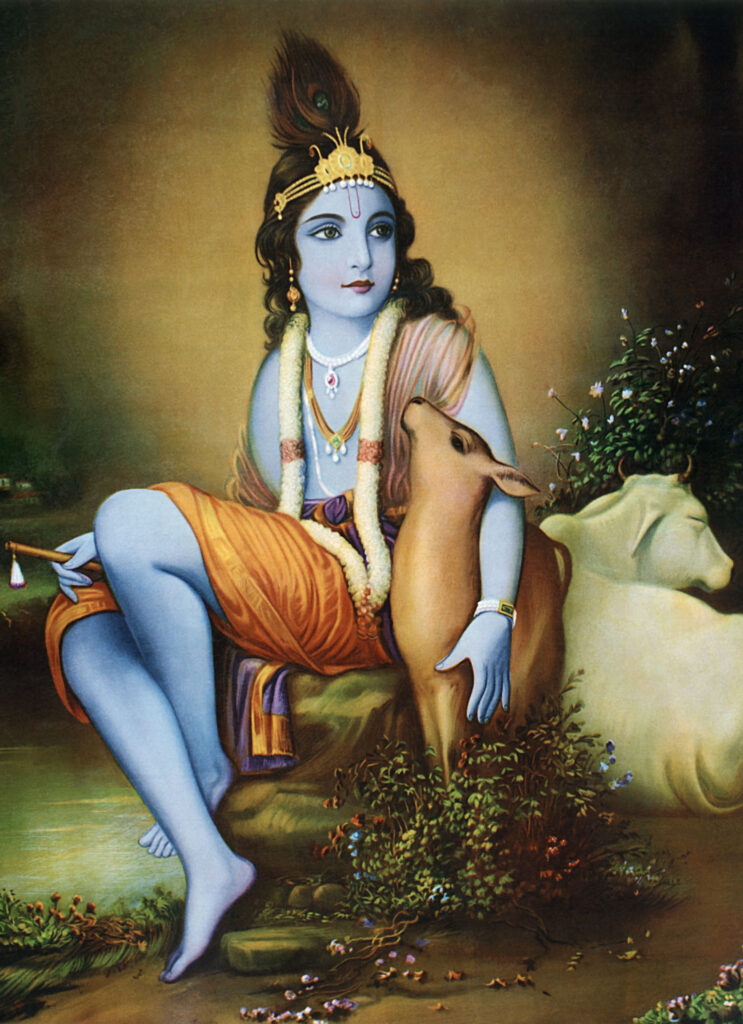
If they are thinking, for instance, that God is an impersonal force, or that we are all God, then it is impossible to actually chant the holy names in a spirit of devotion to the Supreme Person. We have to understand the philosophical background and beliefs of the chanter, and how they have received the mantras, to be able to determine if it is beneficial or perhaps even harmful spiritually to hear their chanting. Are their philosophical viewpoints in harmony with Vedic teachings and the teachings of the great spiritual masters coming in disciplic succession? Do they think that God is a person or an impersonal force – an ocean of spiritual light?
What do the Vedic scriptures say of the nature of the Absolute Truth? Lord Brahma, the head of our disciplic succession, states:
Krishna, who is known as Govinda, is the Supreme Godhead. He has an eternal blissful spiritual body. He is the origin of all. He has no other origin, and He is the prime cause of all causes.
[Brahma Samhita 5:1]
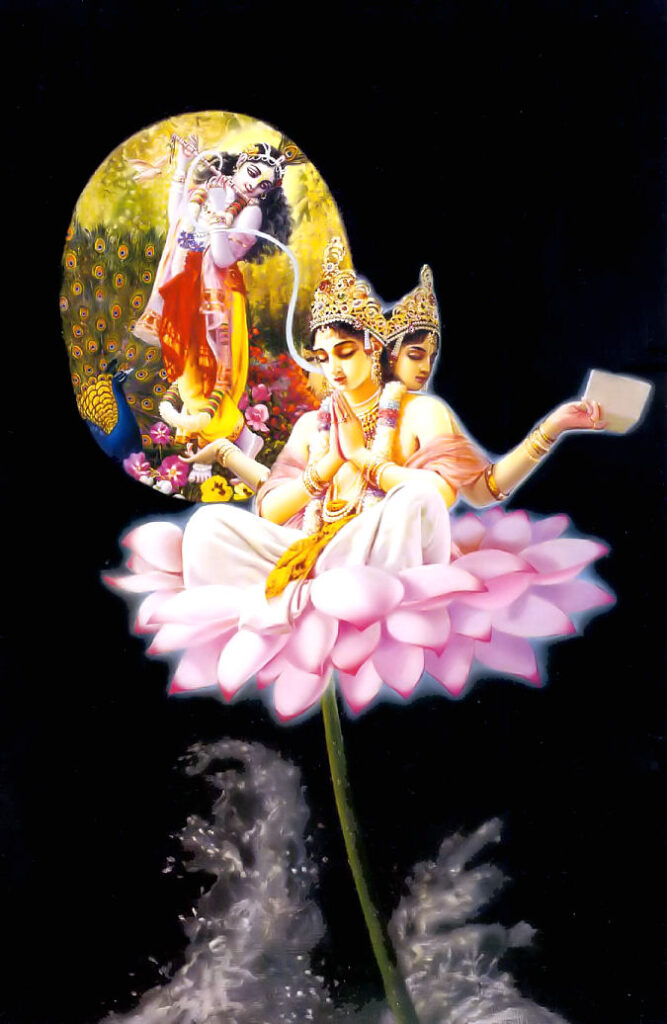
My transcendental body (sac-cid-ananda vigraha) looks exactly like a human form, but it is not a material human body. It is inconceivable. I am not forced by nature to accept a particular type of body; I take on a body by My own sweet will. My heart is also spiritual, and I always think of the welfare of My devotees.
[Srimad Bhagavatam 5:5:19]
What the Upanishads describe as the impersonal Brahman is but the effulgence of His body, and the Lord known as the Supersoul is but His localised plenary portion. He is the Supreme Personality of Godhead, Krishna Himself, full with six opulences. He is the Absolute Truth, and no other truth is greater than or equal to Him.
[Caitanya-caritamrta Adi 1:4]
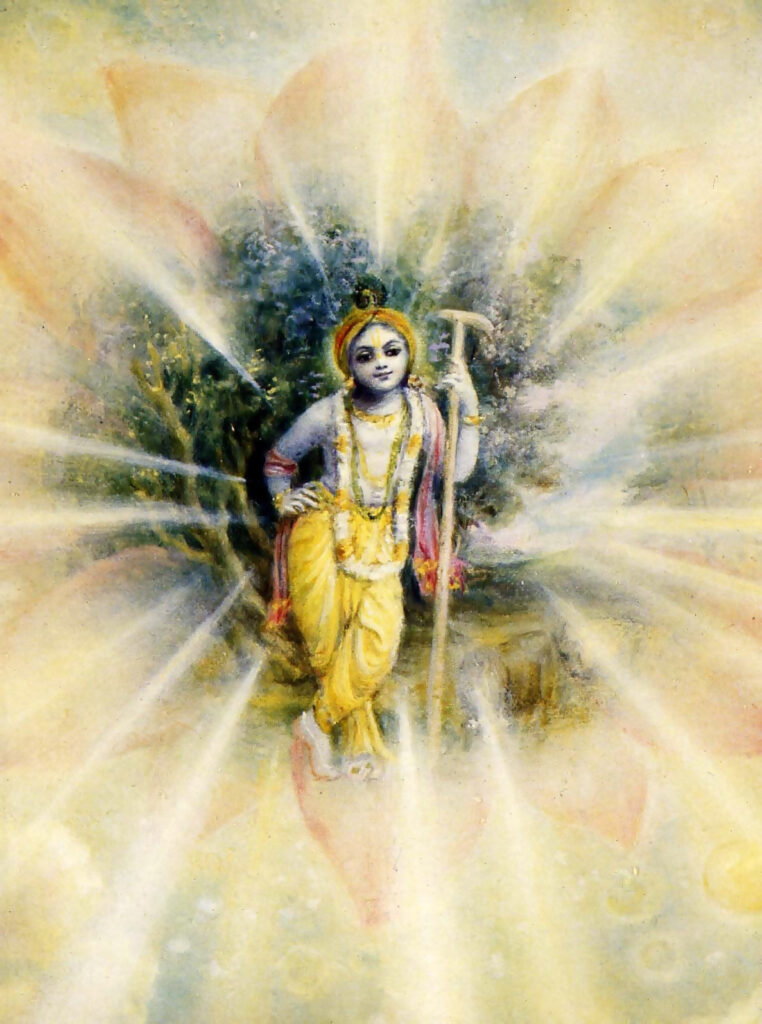
So, the Vedic wisdom describes that the Absolute Truth is simultaneously personal and impersonal, but the personal feature of the Lord, Krishna or Govinda, the Supreme Personality of Godhead, is the original cause of all causes. The Brahman effulgence or impersonal feature of the Lord is secondary to His personal form, being merely His bodily effulgence. That the impersonal formless Brahman effulgence springs from the transcendental form of Krishna, the Supreme Person, is stated repeatedly throughout the Vedic scriptures. In the Upanishads it is said:
O my Lord, O primeval philosopher, maintainer of the universe, O regulating principle, destination of the pure devotees, well-wisher of the progenitors of mankind – please remove the effulgence of Your transcendental rays so that I can see Your form of bliss. You are the Supreme Personality of Godhead, like unto the sun (luminous), as am I.
[Sri Isopanisad m.16]
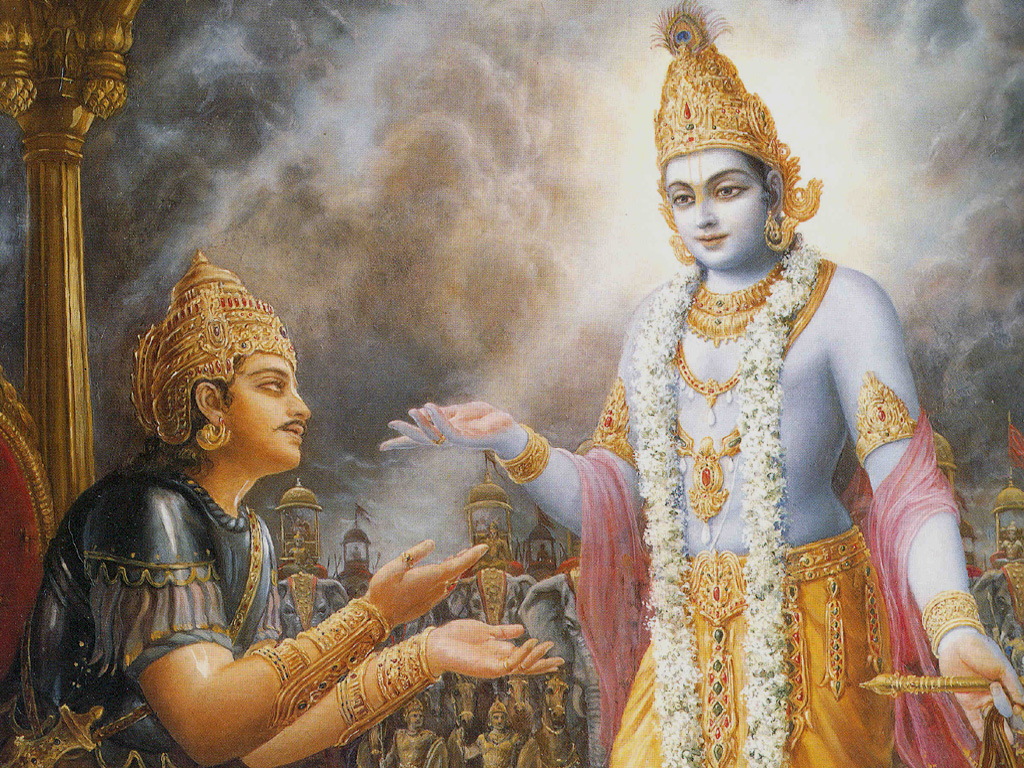
And Krishna says to Arjuna in the Bhagavad-gita:
And I am the basis of the impersonal Brahman, which is the constitutional position of ultimate happiness, and which is immortal, imperishable and eternal.
[Bhagavad-gita 14:27]
The Vedas also establish very emphatically, that Krishna is the Supreme Personality of Godhead, and that He is the ultimate goal of scripture, yoga and all religious processes. The Srimad Bhagavatam states:
In the revealed scriptures the ultimate object of knowledge is Sri Krishna, the Personality of Godhead. The purpose of performing sacrifice is to please Him. Yoga is for realizing Him. All fruitive activities are ultimately rewarded by Him only. He is supreme knowledge, and all severe austerities are performed to know Him. Religion (dharma) is rendering loving service unto Him. He is the supreme goal of life.
[Srimad Bhagavatam 1:2:28-29]
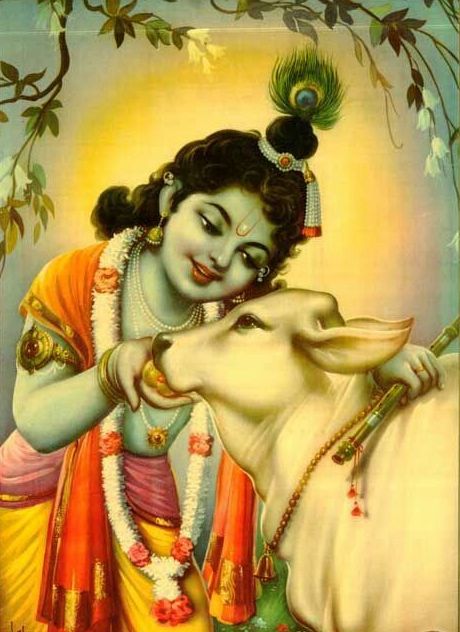
The spiritual masters in our disciplic line refer to those who teach that we are all God, and that God is ultimately impersonal, as “impersonalists.” Such impersonalists wrongly suggest that the impersonal Brahman effulgence is the original cause of all causes, and that all personalities spring from this impersonal Brahman. They also wrongly conclude that individual persons can only exist in the material world. They have no understanding of the fact that Krishna and all of His loving servants have transcendental spiritual forms and exist eternally as persons in the spiritual world, beyond the Brahman effulgence.
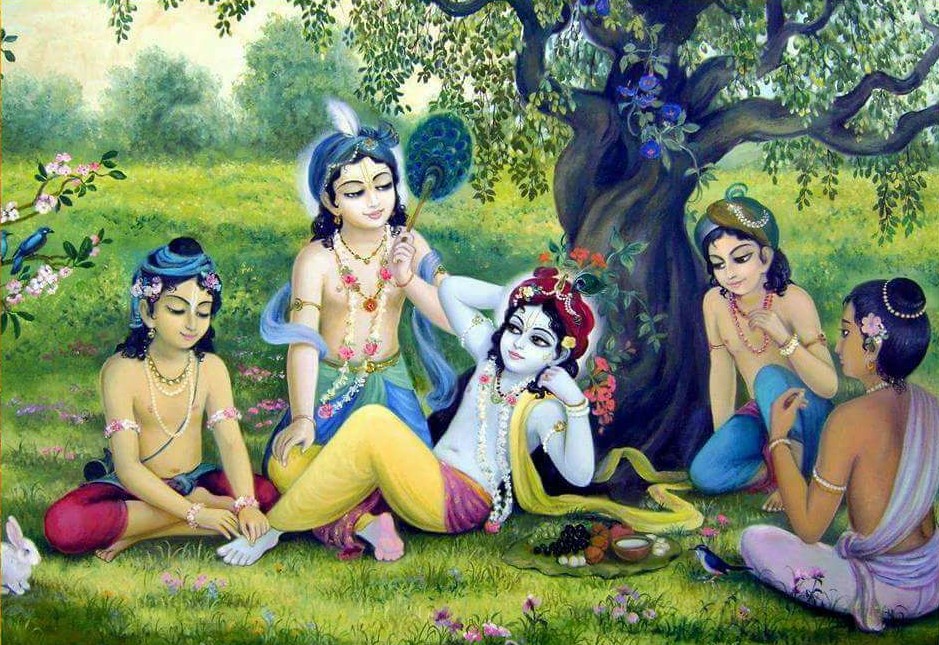
The impersonalists wrongly conclude that Krishna was an ordinary man who attained enlightenment through the practice of yoga or meditation.
Although I am unborn and My transcendental body never deteriorates, and although I am the Lord of all sentient beings, I still appear in every millennium in My original transcendental form.
[Bhagavad-gita 4:6]
Unintelligent men, who know Me not, think that I have assumed this form and personality. Due to their small knowledge, they do not know My higher nature, which is changeless and supreme.
[Bhagavad-gita 7:24]
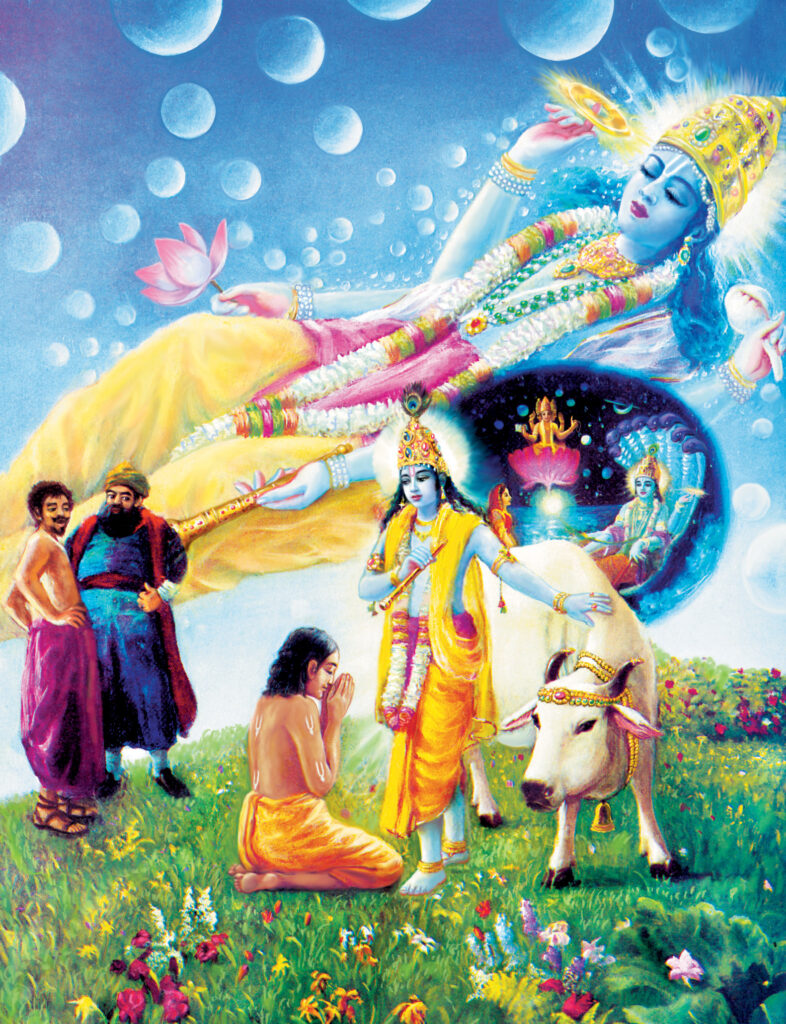
There is one well-known impersonalist teacher who has many followers world-wide. I have no need to name this person. As devotees of God, we have a duty to challenge false teachings which deny that God is all-powerful – saying that He is an ordinary man who can be covered by illusion. But we have no desire to criticize individuals or upset his followers.
This teacher has stated:
Yes, Jesus was an enlightened being just like Buddha, *Mahavira and Krishna.
[*Mahavira preached Jainism in ancient India. He was a contemporary of Lord Buddha who taught ascetic meditation to attain nirvana or the impersonal void.]

Of course, Lord Jesus prayed to his Supreme Father as being someone separate from himself. He made it very clear that he was the servant of the Supreme Lord. He never claimed to be God:
I have not come to do my will, but the will of the one who sent me. … The One who sent me is with me; he has not left me alone, for I always do what pleases Him.
[John 6:38; John 8:29]
So, by saying this, this impersonalist teacher is saying that Jesus and Krishna are on the same level, souls who came to realize that they are God. And as many worshipped him as being “God incarnate” he is thereby claiming that Krishna is just like him, an ordinary man who attained perfection. He further says:
When Krishna says, “Come to my feet!” he is saying, “Here, look! The emptiness is standing before you. Dissolve into it!” But that won’t be direct. He has to use Arjuna’s language. He says, “Come to my feet.” If Arjuna is ready and willing to surrender, if he trusts and surrenders, when he touches the feet of Krishna, he will touch emptiness. Only then will there be a realization of what Krishna was saying. There are no feet, no Krishna — just a tremendous quality of emptiness. The temple of God is emptiness. Touching Krishna’s feet, he will bow down to emptiness and the emptiness will pour down into him. But that will be possible only when he trusts.
Krishna can say, “I am God,” because he is not. In fact, it is not Krishna saying, “I am God.” It is God saying, “I am.” Krishna is not there. He appears to Arjuna because our eyes are blind. He appears to us because we cannot see. When Krishna says, “I am God,” we think it is Krishna saying, “I am God.” In fact, Krishna is no more there. It is God saying, “I am! I am!” — that’s all.
So, in these quotes from this impersonalist teacher, he is making a number of false claims which contradict the teachings of Vedic scripture. The first is that Krishna was an ordinary man who attained enlightenment – became a siddha or person who has perfected himself, such as Lord Jesus Christ or other great devotees or sages. But the Vedic scriptures very clearly teach that Krishna is the Supreme Being, that He has a transcendental spiritual form, and that He is never forced to accept a material body like the conditioned souls in the material world. To say otherwise is to deny that God is all powerful and all-wise. It is offensive to say that God can be covered by ignorance like an ordinary conditioned soul, and that He is forced to take on a material body and suffer birth, disease, old age and death.

All the varied expansions of the Personality of Godhead are transcendental and eternal, and all of them repeatedly descend to all the different universes of the material creation. Their bodies, composed of eternity, bliss and knowledge, are everlasting; there is no chance of their decaying, for they are not creations of this material world. Their forms are concentrated spiritual existence, always complete with all spiritual qualities and devoid of material contamination.
[Maha-Varaha Purana. Quoted in purport C.c. Adi 5:41]
Another misconception being presented in these quotes is that he is totally misrepresenting Krishna’s teachings in Bhagavad-gita, by saying that when Krishna instructs Arjuna to surrender to Him, He is actually claiming that Krishna is not real and Arjuna is meant to merge with the void:
There are no feet, no Krishna — just a tremendous quality of emptiness. The temple of God is emptiness. Touching Krishna’s feet, he will bow down to emptiness and the emptiness will pour down into him.
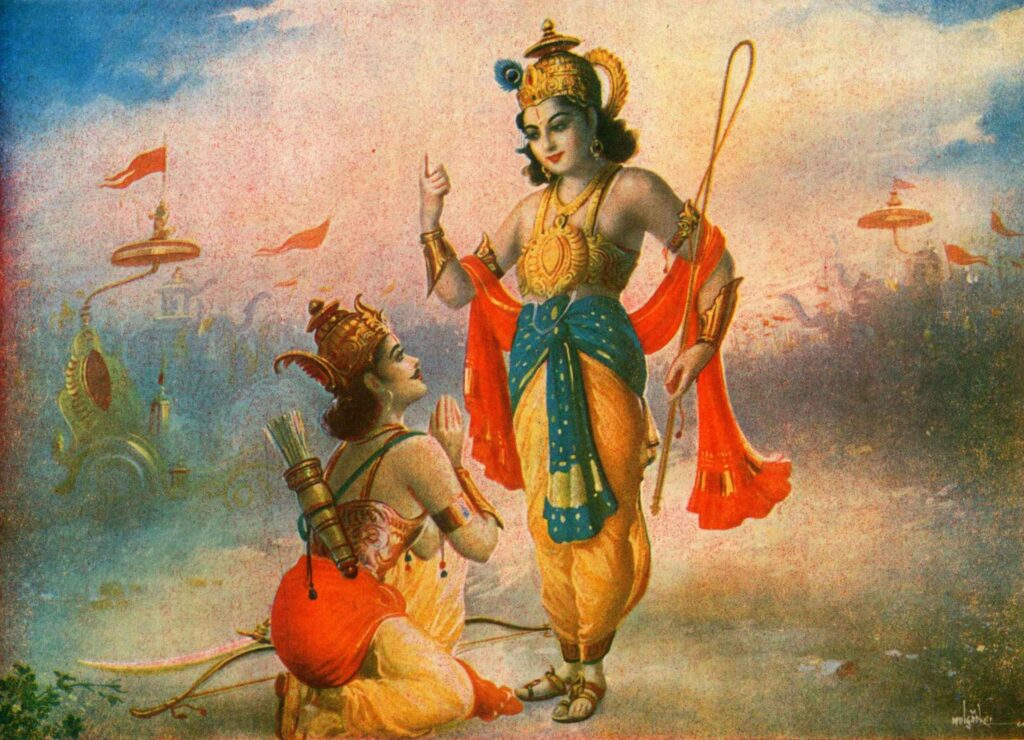
This teaching is most offensive and repugnant to a devotee who has love for Krishna. The Bhagavad-gita very clearly instructs us that we should meditate upon and worship Krishna’s transcendental spiritual form:
Arjuna inquired: Which is considered to be more perfect: those who are properly engaged in Your devotional service, or those who worship the impersonal Brahman, the unmanifested? The Blessed Lord said: He whose mind is fixed on My personal form, always engaged in worshiping Me with great and transcendental faith, is considered by Me to be most perfect.
[Bhagavad-gita 12:1-2]
The devotee has no attraction for a void where there can be no awareness of Krishna or his own self, because the devotee’s goal is to experience yoga – the loving union between the individual soul and the Supreme Soul. The devotee hopes to live eternally in a loving relationship with the Lord in the spiritual world, where Krishna engages in the sweetest of loving pastimes with His devotees in their swarups – their eternal spiritual forms.
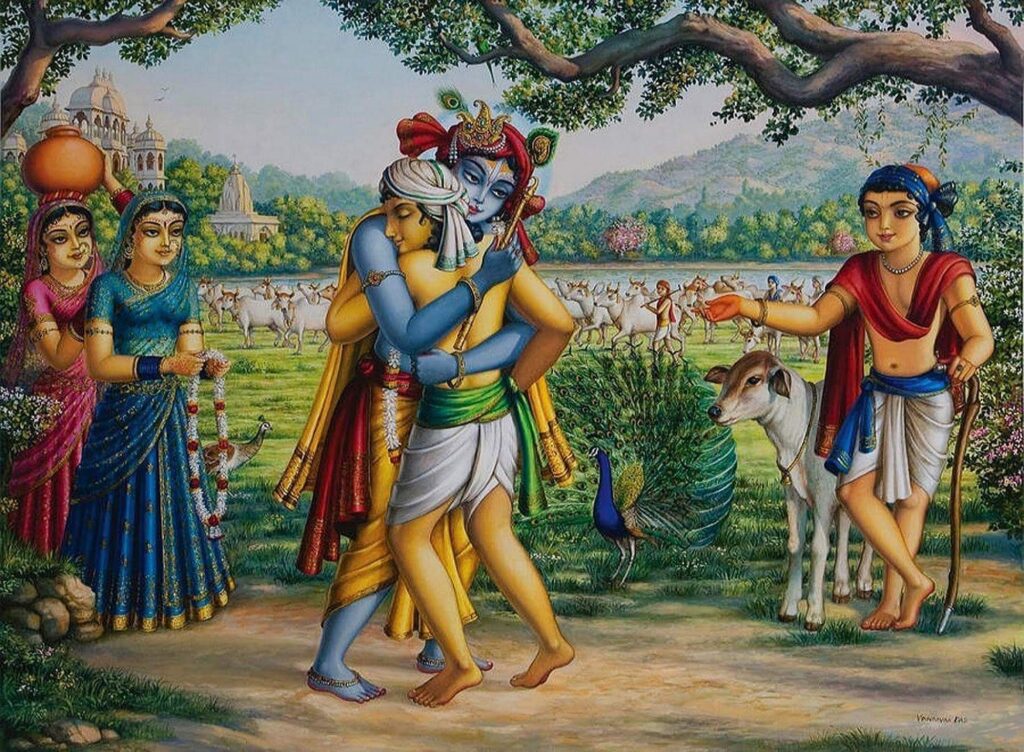
And Krishna promises His devotee that this will happen:
If My devotee is unable to remember Me at the time of death because of disturbances felt within the body at that time, then I shall remember My devotee and take him back to My supreme abode.
[Varaha Purana]
The impersonal Brahman effulgence or void cannot come to take us home. In the merged condition there is no love or even the awareness of others. And the thought of spending all eternity in a void of endless emptiness is most fearful and unattractive to a bhakta – a lover of God. Krishna reassures Arjuna in the Bhagavad-gita:
Always think of Me and become My devotee. Worship Me and offer your homage unto Me. Thus you will come to Me without fail. I promise you this because you are My very dear friend.
[Bhagavad-gita 18:65]

Impersonalists Cannot Chant God’s Names
The above quoted impersonalist teacher has two well-known followers who have forged a successful career over the last thirty years, offering concerts and chant workshops worldwide, and selling many albums with mantras and melodious music.
One of the mantras chanted is Om namo Bhagavate Vasudevaya. This is the first line of the first verse of Srimad Bhagavatam, which means “The Beautiful Narration of the Supreme Personality of Godhead.” Srimad Bhagavatam was first written down 5,000 years ago by Vyasadeva, the author of the Vedic scriptures. He describes Srimad Bhagavatam as being “the ripened fruit of the tree of Vedic knowledge.”
Om namo Bhagavate Vasudevaya translates as:
O my Lord, Sri Krishna, son of Vasudeva, O all-pervading Personality of Godhead, I offer my respectful obeisances unto You.
The verse continues:
I meditate upon Lord Sri Krishna because He is the Absolute Truth and the primeval cause of all causes of the creation, sustenance and destruction of the manifested universes.
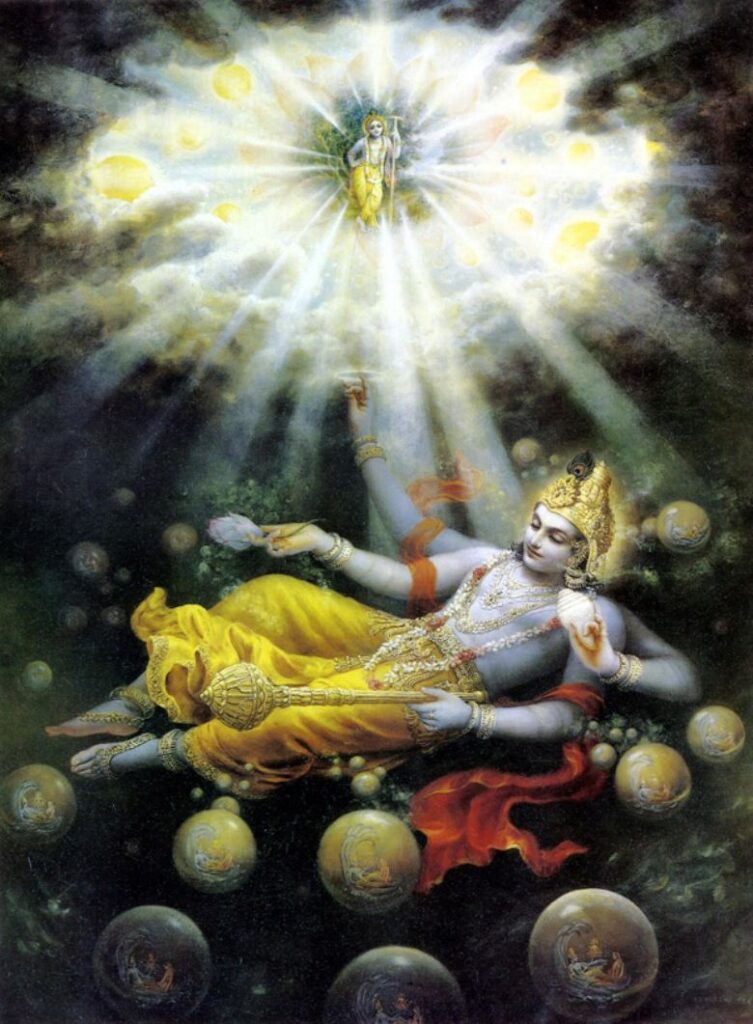
They also chant the maha-mantra, the Hare Krishna mantra. The maha-mantra is a type of prayer or calling out to Krishna – the Supreme Lord – and His pure servants, to give protection to the conditioned soul. When devotees of Krishna chant this mantra, they are taking shelter of Krishna in His form as transcendental sound, and humbly petitioning Him to purify their hearts and minds, and to restore them to their natural condition as the Lord’s eternal loving servant. One who denies Krishna’s eternal existence in the spiritual world can only chant the external shell of the mantra. No matter how musically attractive such chanting may seem, Krishna is not present in the sound vibration.
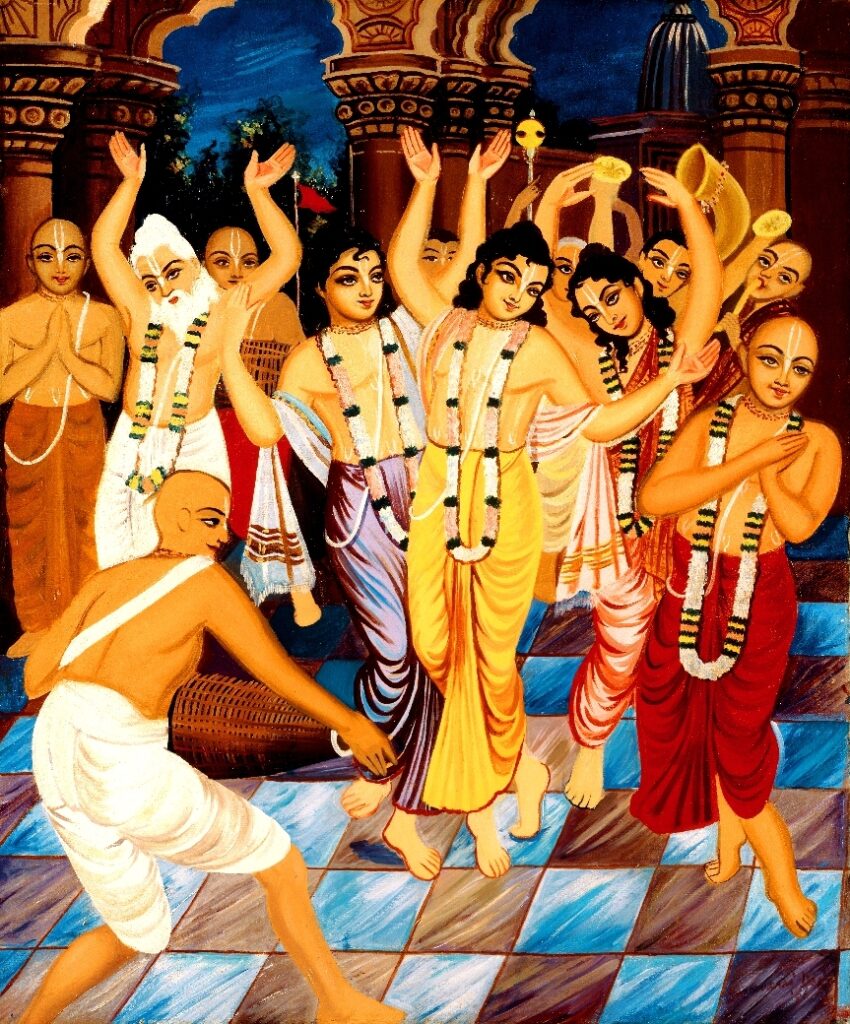
Only a devotee of Krishna is qualified and capable of chanting these mantras. Understanding that all material names and forms spring from the formless Brahman effulgence, impersonalist philosophers wrongly conclude that the names and forms of the Supreme Lord are products of the material energy. They do not know that Krishna exists eternally as a transcendental person in the spiritual world, and that when He descends to this world He comes in His original transcendental [non-material] form:
All living entities, moving and non-moving, are My expansions and are separate from Me. I am the Supersoul of all living beings, who exist because I manifest them. I am the form of the transcendental vibrations like omkara and Hare Krishna, Hare Rama, and I am the Supreme Absolute Truth. These two forms of Mine – namely the transcendental sound and the eternally blissful spiritual form of the Deity, are My eternal forms; they are not material.
[Srimad Bhagavatam 6:16:51]
Although I am unborn and My transcendental body never deteriorates, and although I am the Lord of all sentient beings, I still appear in every millennium in My original transcendental form.
[Bhagavad-gita 4:6]
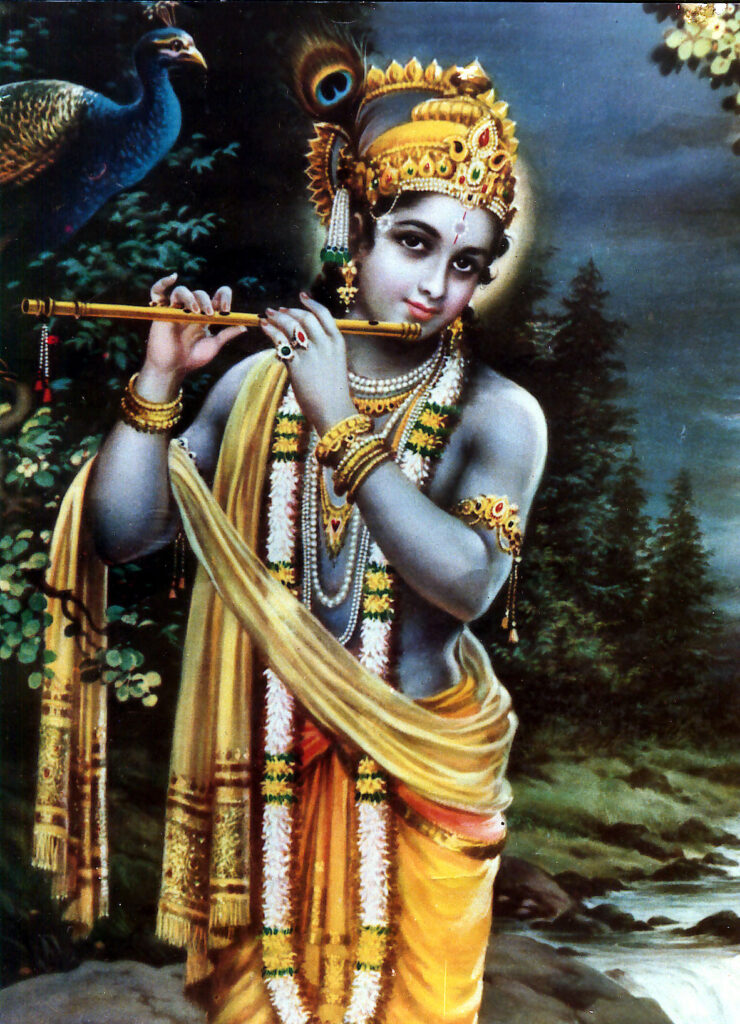
If we want to attain love for Krishna, we should only hear from one who has love for Krishna, and who accepts His eternal transcendental existence. According to the Vedas and teachings of great saintly teachers coming in disciplic succession from Krishna, we should not hear the chanting or teachings of impersonalists or professional musicians and philosophers or so-called gurus:
… Sri Bhaktisiddhanta Sarasvati Gosvami Maharaja has also remarked that professional spiritual masters, professional [Srimad] Bhagavatam reciters, professional kirtan performers and those engaged in self-concocted devotional service cannot be accepted.
[Srila Bhaktivedanta Swami: Teachings of Lord Chaitanya ch. 29]
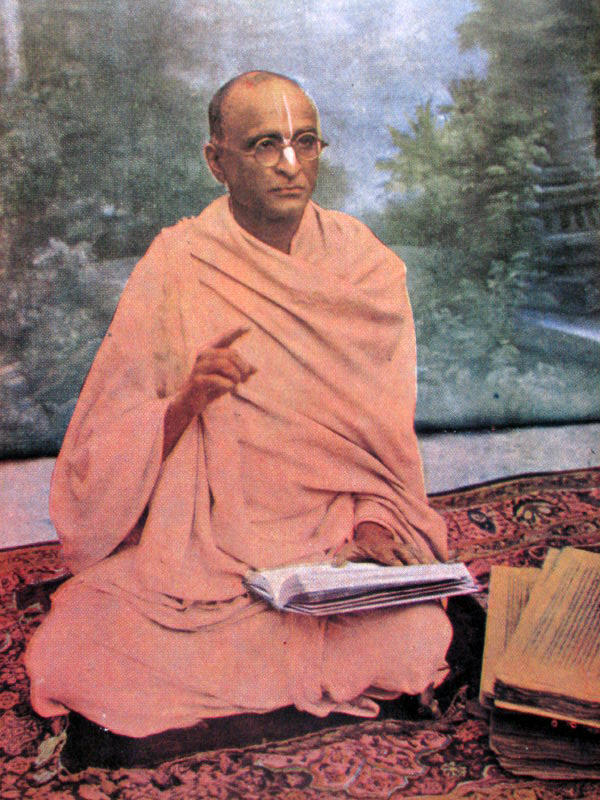
In the Padma Purana it is stated:
If one is not actually connected with a bona fide disciplic succession, whatever mantras he chants will not bring the desired result.
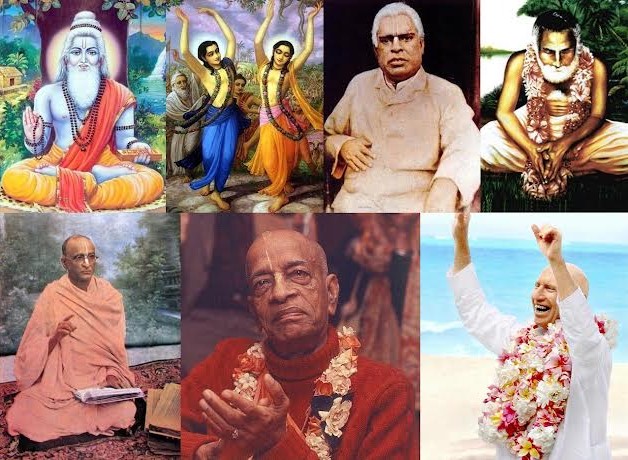
No one should hear or take lessons from a person who is not a Vaisnava. Even if he speaks about Krishna, such a lesson should not be accepted, for it is like milk touched by the lips of a serpent.
[Padma Purana]
In India, perhaps in other places as well, milk would sit in a bucket after the cow was milked, and sometimes a poisonous snake would come to the bucket and drink the milk, and poison from the serpent’s fangs would drip into the milk and poison it, with deadly effect. So the Padma Purana is here stating that the words and mantras chanted by a non-devotee are not only not spiritually potent, but they actually have a harmful effect upon our consciousness. A person is influenced by the consciousness of the person they hear from.

Impersonalists do not accept that transcendental names and forms exist beyond the material universes. In their formless conception of the spiritual world, they deny that Krishna’s names and form are eternally existing. They think they are products of the material world, like the names and forms of conditioned souls. In this regard, Srila Bhaktivedanta Swami has stated:
… In the spiritual world there is no difference between the name of the person and the quality of the person. Of course, in the material world there is a difference. Because the Mayavadi philosophers cannot understand this, they cannot utter the transcendental vibration. …
[Srila Bhaktivedanta Swami: “On Chanting Hare Krishna”]
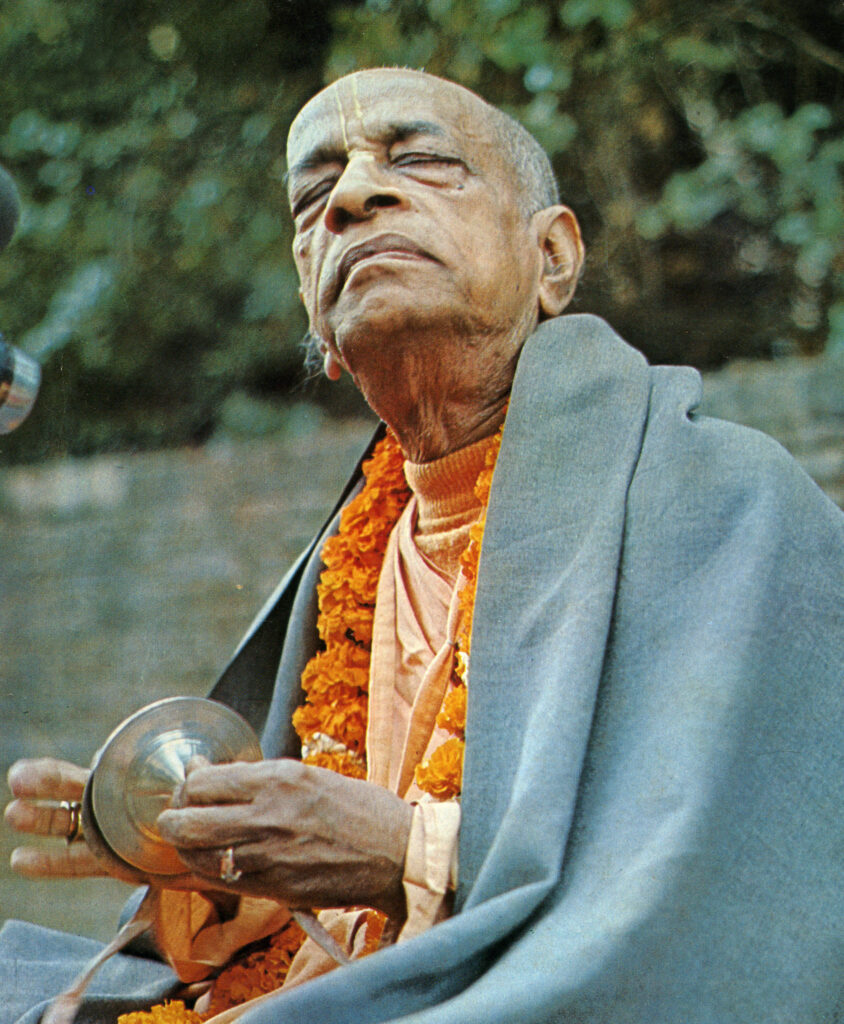
One has to learn about the beauty and transcendental position of the holy name of the Lord by hearing the revealed scriptures from the mouths of devotees. Nowhere else can we hear of the sweetness of the Lord’s holy name.
[Caitanya-caritamrta Antya 1:101]
In the purport to this verse, Srila Bhaktivedanta Swami states:
… Chanting and hearing of the transcendental holy name of the Lord cannot be performed by the ordinary senses. The transcendental vibration of the Lord’s holy name is completely spiritual. Thus, it must be received from spiritual sources and must be chanted after having been heard from a spiritual master. One who hears the chanting of the Hare Krishna mantra must receive it from the spiritual master by aural reception. Srila Sanatana Goswami has forbidden us to hear the holy name of Krishna chanted by non-Vaisnavas, such as professional actors and singers, for it will have no effect. It is like milk touched by the lips of a serpent …
[From purport to Caitanya-caritamrta Antya 1:101]

O brothers, the holy name of Krishna is never to be found in the association of those who are unsaintly. The external sound of the holy name is never the name proper.
[Prema-vivarta: Jagadananda Pandit]
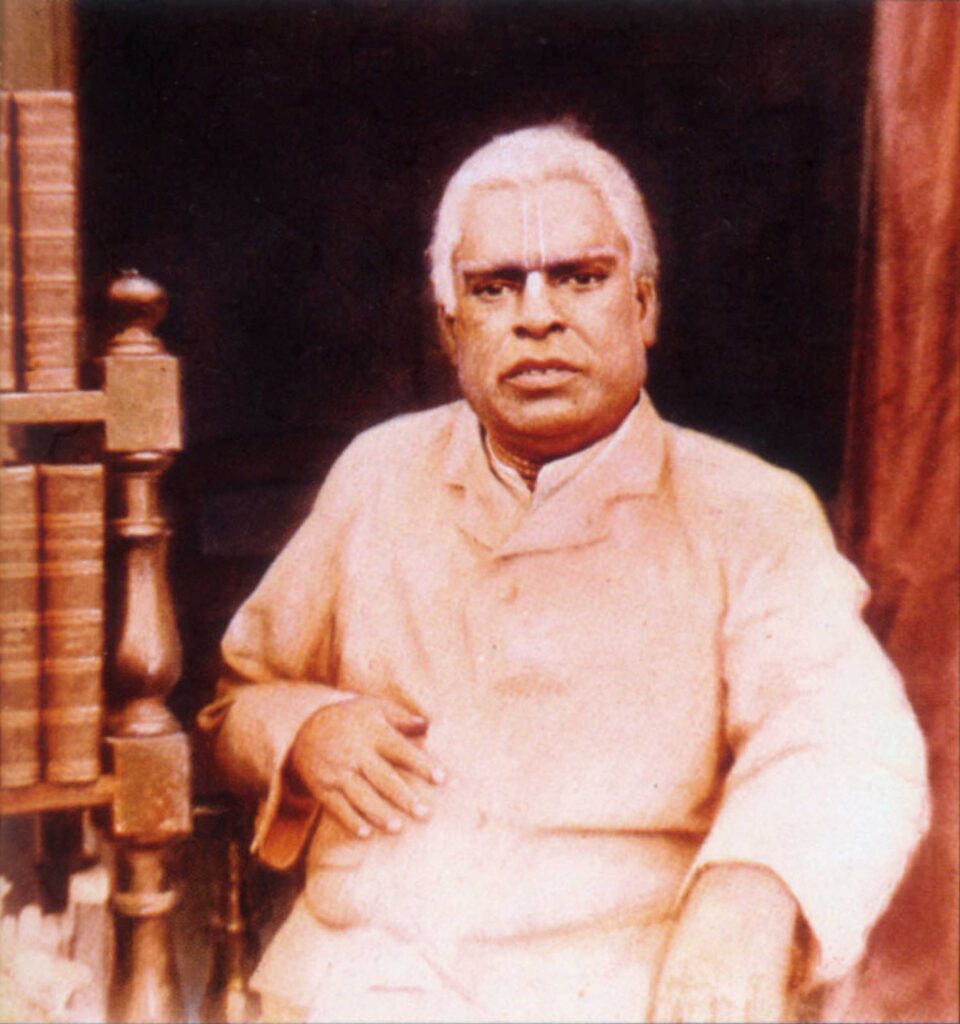
There is a story from the life of Srila Bhaktivinoda Thakur [1838-1914], a great spiritual master in our disciplic line, which explains the difference between the “lip deep sound” and the holy name’s “spiritual essence.” I have included an extract from this story:
Bhaktivinoda Thakur and the Ghostly Priest of Kulinagrama
“The gentleman who was formerly the priest of that temple was transformed into a ghost after his departure. Since that time, we have regularly seen the disturbances caused by that ghost. Why did he become a ghost? As the priest of that temple, he used to regularly chant the holy name of Krishna. We are witness to that fact; we have all heard him. Why was he turned into a ghost? We cannot understand this. Please explain.” …
Bhaktivinoda Thakur told them that the priest must have only repeated the syllables of the name, the nama-aksara. What he was producing was only a mayik sound, a physical, lip-deep sound. It did not have the spiritual essence; the life of the name was absent when he was chanting. It was nama-aparadha, offensive chanting. Bhaktivinoda asked them, “What was his character?” They said, “He was not a good man. He committed many sinful acts. That we know. But we can’t deny the fact that he used to chant the name of the Lord almost always. How could he become a ghost?”
Bhaktivinoda Thakur explained that the physical sound of the name is not the name proper. The priest had been committing offenses to the holy name (nama-aparadha), and as a result became a ghost. They asked, “Then how can he be released from that wretched condition?” Bhaktivinoda said, “If he meets a bona fide sadhu who has a genuine connection with Krishna, and he hears the real name, or the proper explanation of Bhagavad-gita or Srimad-Bhagavatam from his lips, then he may be released from his ghostly condition. It is mentioned in the scriptures that this is the only way to become free from the entanglement of material nature.”
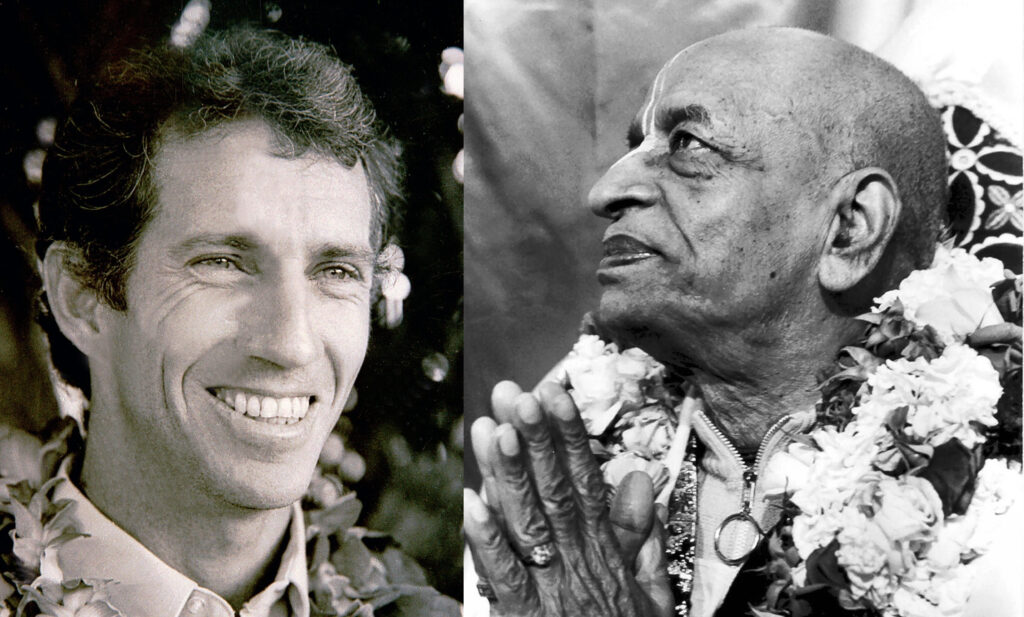
We are not All-powerful God
How many times do we desperately want something to happen and it doesn’t happen? And conversely, there are times when we so strongly desire that something doesn’t happen, and it happens anyway. Our will is not always “done on earth as it is in heaven” – we are not all-powerful – we are not God. God is all-powerful and all-wise (omnipotent and omniscient). He never forgets that He is God. He never comes under the spell of ignorance. God does not suffer under nature’s stringent laws. He is not subject to birth, disease, old age and death like an ordinary conditioned soul. Nature’s laws and the material energy are always under His control. In the Bhagavad-gita [11:41-42], Arjuna calls Krishna Acyuta – “the infallible one.” God is all-knowing – He is never covered by ignorance.
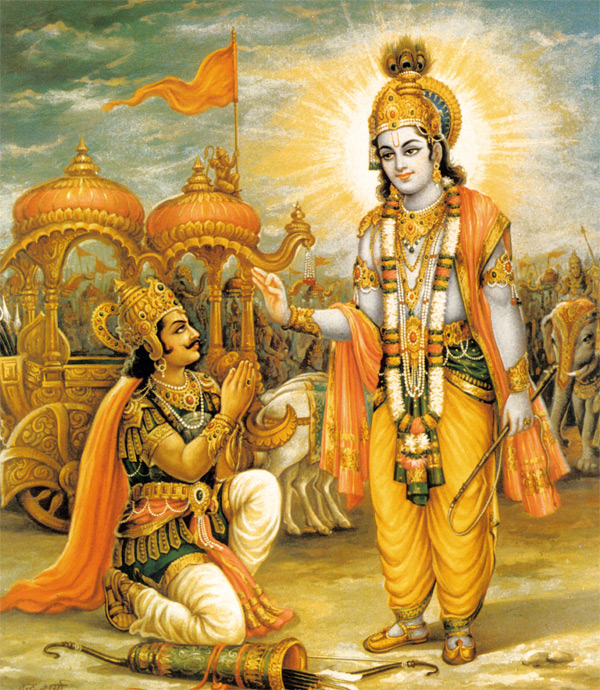
There are many swamis, yogis and so-called gurus in the world today teaching people that they are God. It is a good business. People like to be told that they are God or will become God. This is due to their envy of God, their desire to be number one, the centre of their own little universe. At this point we’ll look at a few quotes from various “I-am-Godist” teachers just to help us understand their philosophy:
Meditate on your Self. Honour your Self. Worship your Self. Understand your Self. God dwells within you as you.
The game is not to know God; the game is to be God.
The word ‘brahmacharya’ means that you have come to attain, you have come to know that you are Brahman, the ultimate, the divine, that you are God Himself.
This teaching that we are all God is very common in the world today. But if we actually read Vedic scripture, or other religious scriptures, we find that this idea is rejected rather than supported. Nor is the idea that we are all God taught by great saintly teachers. We are not the Supreme Lord. We are individual spirit souls, sparks of the Supreme Soul. We are His parts and parcels. We are the same as God in quality – that is, we are brahman or spirit. But we are not the Supreme Spirit, who is the owner, controller and enjoyer of all that exists. The Vedic scriptures and all saintly teachers worship God as the original cause of all causes. He is all-powerful, all-wise and all-beautiful.
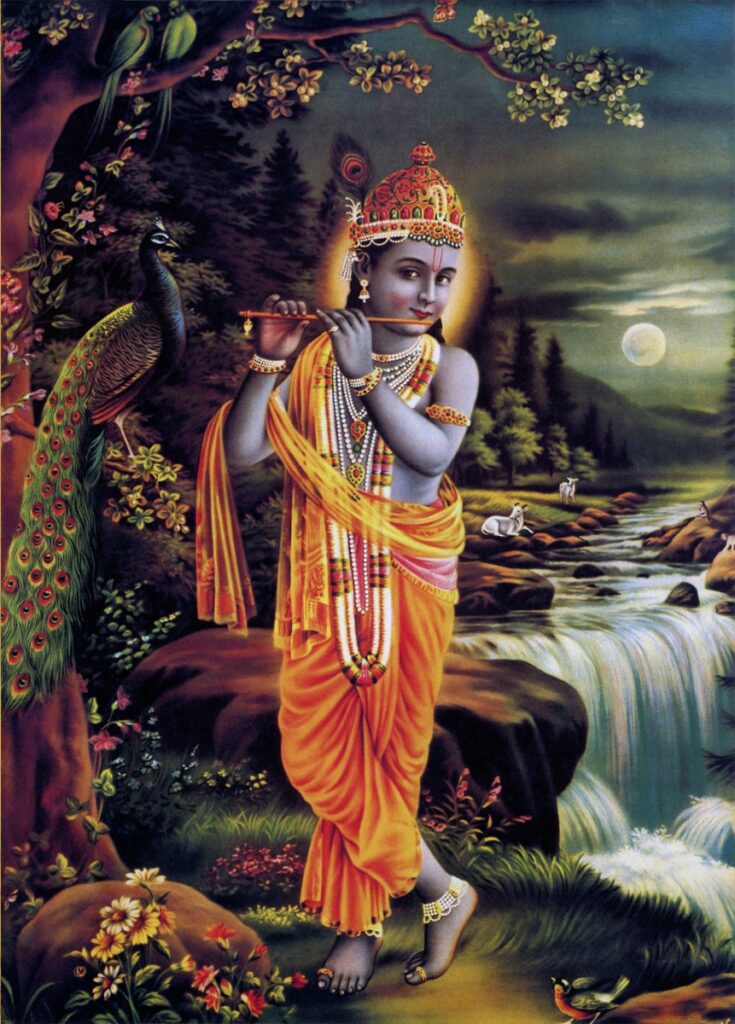
We can easily understand that we are not God because we’ve become covered by ignorance. I may think that I am God, but the fact that I can became covered by ignorance, covered by illusion, is proof that I am not all-wise or all-powerful – I am not God. To say that God can become covered by ignorance, is to say that maya, or illusion, is more powerful than God. To say that God can fall under the control of His own illusory energy denies His power and wisdom. This is atheism. And to say that we are all God is the same as saying that there is no one Supreme Being. This is also atheism in the guise of pseudo “spiritual wisdom.”
Impersonalists and Pseudo-Bhakti
Many so-called gurus and yoga teachers see no difference between Krishna’s names and forms and the names and forms of the demigods or so-called incarnations, sometimes called “godmen.” These “godmen” are ordinary conditioned souls who are claiming that they have meditated or somehow become enlightened and realized that they are God. And they love to be worshipped by foolish followers as being the Supreme Soul. Ultimately, they think that the Absolute Truth is the Impersonal Brahman, and that all names and forms spring temporarily from this source, and therefore all are equal manifestations of formless, nameless Brahman. One impersonalist teacher had altars in his ashrams that consisted of a mirror, so that his foolish followers could meditate upon their own material forms as being God.
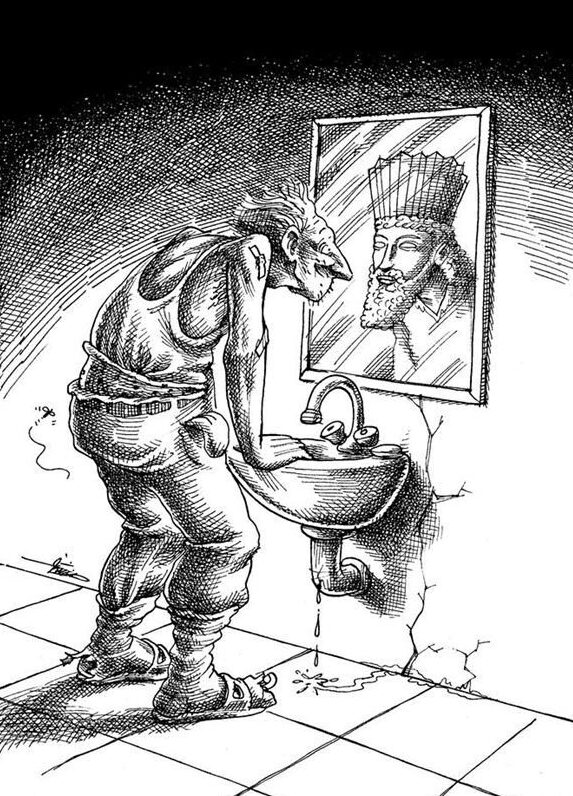
Mirror mirror on the wall, who is greatest of them all?
Such impersonalists think that “bhakti” means to develop some sentiment, some religious fervour, and that this will carry them to the point where they must then renounce the names they chant and the deity forms they have worshipped – in order to achieve liberation by merging into the formless. Therefore, they think the sacred mantras, the names of Krishna, are only temporary material sounds. Because they think the spiritual world is formless and nameless, they think the Lord’s holy names are manifest only in the material world, and that no name or form can exist in the spiritual dimension which they imagine is void of personality, form, sound, variegatedness and relationships.
However, we know that Krishna and his friends and the world that they inhabit are full of the most wonderful spiritual qualities, varieties and relationships. These are described in great detail in Srimad Bhagavatam and other Vedic literatures. The spiritual world of the Vedas is not void, zero, blank, formless, nameless nothingness.
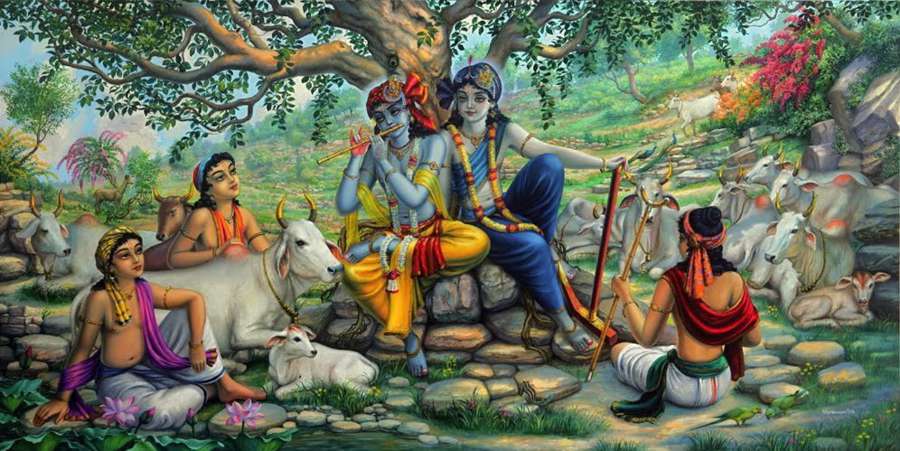
The impersonalist simply uses the form of the deity and the name of the Lord or some demigod to attain liberation – he has no real or lasting love or attraction. His so-called worship is simply a technique to attain mukti [impersonal liberation]. One famous impersonalist teacher said:
In the stage of sadhana, you worship Hanuman [his deity]. In the stage of enlightenment, you become Hanuman.
Imagine if I walked in on a friend sitting quietly in his room, and heard him soulfully saying his wife’s name. If I said, “Who is this ‘Gladys’ that you’re meditating on with such devotion?” Do you think he would say, “It’s no-one really – Gladys doesn’t really exist. I just made her up so that I could feel a little sentiment and pretend that I’m in love. But actually, she’s not real. I’m God and no-one exists except me. All relationships are just an illusion.” How would this make Gladys feel? If she found out there’d be hell to pay. It’s the ultimate snub, to pretend to love someone, and then to deny their existence. This is the pseudo-bhakti of an impersonalist.
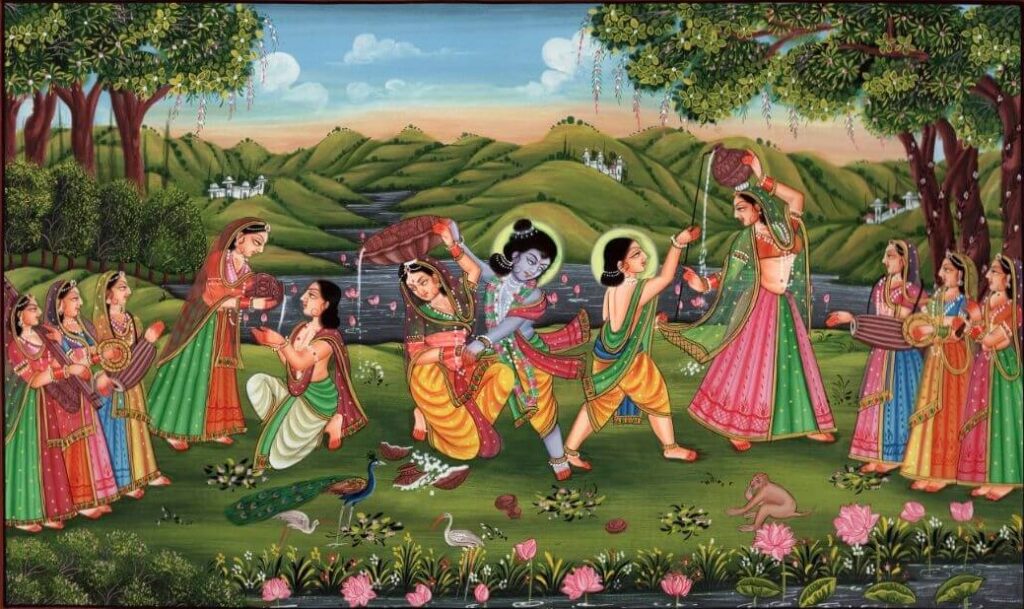
Krishna’s name, form, qualities, pastimes and words are all eternal and transcendental to the material world. They have descended from the spiritual world via His incarnation, the holy scriptures and via disciplic succession. The attachment and love a devotee experiences for these transcendental manifestations of God are also eternal, and are not some temporary sentiment or emotion to be abandoned when liberation is offered. We do not use Krishna to gain something better. There is nothing better. The devotee desires to love and serve Krishna for all eternity.
Because the Lord is all-pure, His holy names have complete power to purify our hearts and minds, and will gradually bring us to the point of perfect love for God. In the Padma Purana it is stated:
The holy name of Krishna is transcendentally blissful. It bestows all spiritual benedictions, for it is Krishna Himself, the reservoir of all pleasure. Krishna’s name is complete, and it is the form of all transcendental mellows. It is not a material name under any condition, and it is no less powerful than Krishna Himself. Since Krishna’s name is not contaminated by the material qualities, there is no question of its being involved with maya. Krishna’s name is always liberated and spiritual; it is never conditioned by the laws of material nature. This is because the name of Krishna and Krishna Himself are identical.
[Padma Purana]
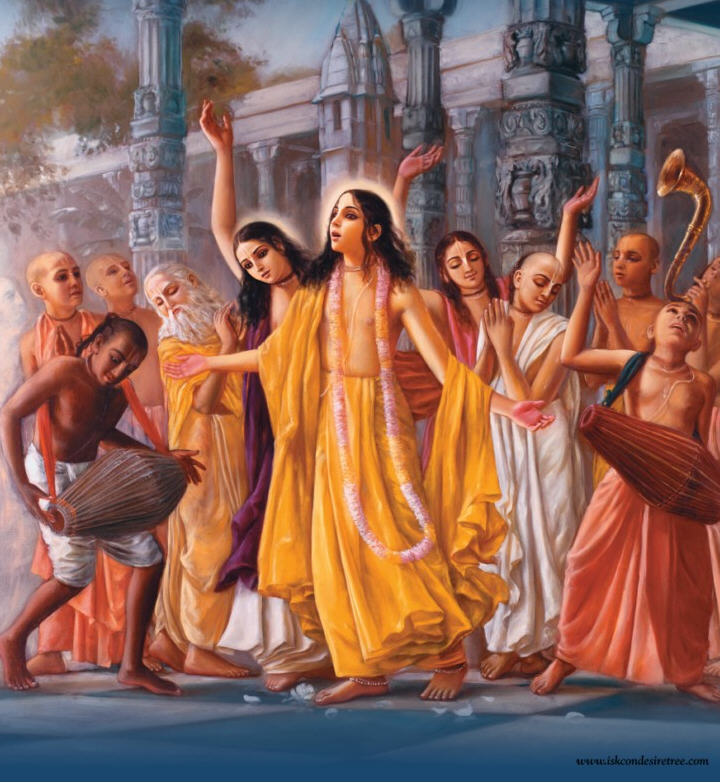
And Krishna says to Arjuna in the Adi Purana:
Anyone who is engaged in chanting My transcendental name must be considered to be always associating with Me. And I may tell you frankly that for such a devotee I become easily purchased.
[Adi Purana]
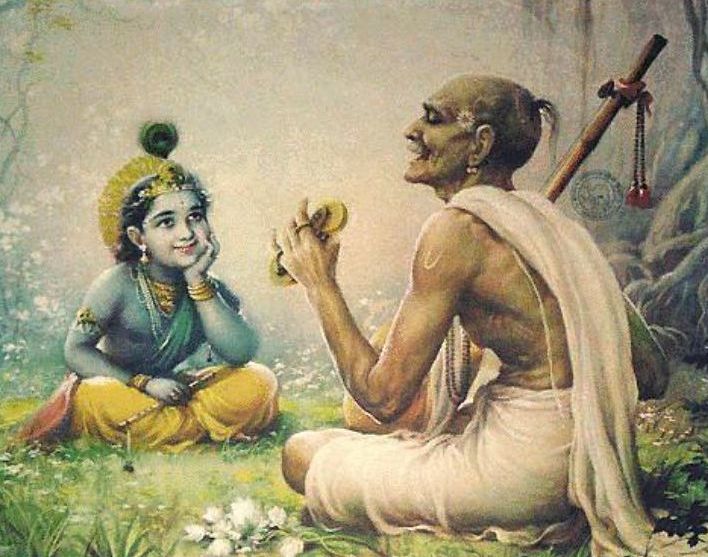


Leave A Reply